小学英语四种时态对比表
小学英语四大时态比较表知识分享

2.行为动词过去式
1.be going to +do
2.will /shall+do
一般疑问句
1.把动词be放于句首
2.用助动词do提问,如主语为第三人称单数,则用does,同时还原为动词原形。
把be动词放在句首。
1.把was或 were放于句首。
2.用助动词did提问,同时还原为动词原形。
动词原形
1.be放在句首。
2.will/shall提到句首。
否定句形式
1.be(am/is/are)+not
2.此时态的谓语动词若为行为动词,则在其前加don’t;若主语为第三人称单数,则用doesn’t,同时还原行为动词。
主语+am/ is/ are +not +doing
1.主语+was/were+ not
2. 在行为动词前加didn’t,同时还原行为动词。
1.be+not going to + do
2.will /shall+not+ do
动词
变化
1.主语非三单,动词用原形。
2.主语是三单,动词变三单形式:
1)大多数动词在词尾加“S”。
2)以辅音字母加“y”结尾的,要先将“y”变为“i”,然后在加“es”。
tomorrow,soon,
tomorrowmorning/afternoon,
the day after tomorrow ,
next Sunday/week/year/month,
结构
1.主语+be动词(am/is/are)+名词/形容词
2.主语+行为动词
主语+be(am/ is/ are )+doing
小学英语四种时态对比表.pdf

一般现在时一般过去式现在进行时一般将来时概念经常、反复发生的动作或行为及现在的某种状况。
用来叙述经常性发生的事情、习惯和爱好等。
一般过去时表示过去某个时间发生的动作或存在的状态,用在叙述某人正在做某事的时候。
(某动作正在进行)叙述将要发生的事情或打算。
表示将要发生的动作或存在的状态及打算、计划或准备做某事。
时间状语always, usually,often, sometimes,never, every week(day, year,month…), once aweek, on Sundays,ago, yesterday,the day beforeyesterday,in 1989, just now,at the age of 5,one day, longlong ago,now, at this time, thisweek, at thismoment,用look, listen提醒听者注意正在发生的事tomorrow, nextday(week, month,year…),soon, in afew minutes,by…,the day aftertomorrow,基本结构1)动词原形(如主语为第三人称单数,动词上要加(e)S)2)am/is/are+形容词/名词。
1)was/were+形容词/名字2)行为动词(动词过去式)am/is/are+doing1)am/is/are/going to+ do2)will + do否定式1) am/is/are+not。
2)谓语动词若为行为动词,则在其前加don't,如主语为第三人称单数,则用doesn't,同时还原行为动词1)was/were not2)didn’t +动词原形am/is/are+not+doing1)am/is/are/goingto+not+ do2)will + not; 在行为动词前加willnot,同时还原行为动词。
小学英语4种时态总结表

一
般 过 去
表示过去时间内发生的动作 或存在的状态
时
1、 yesterday, last week/ year/ month 等
2、 two years ago/ in 2005 / at that time 等
1、 动词 be 的过去时( were)
2、 行为动词的过去式
动词过去式: Be(was, were) 动词 +ed (talked)
时 态
定义
标志词
小学英语 4 种时态复习 谓语形式
一 1、 表示当前或现阶段事物
ቤተ መጻሕፍቲ ባይዱ
般
的状态、特征。
现 2、 表示经常性、习惯性、规
在
律性的动作。
时 3、 表示客观真理、客观存
在、客观事实。
频度副词: 例: always, usually, often,
sometimes, every day(month 、 week… .)
was,
1、 was / were 放主 语前
2、 主语前加 did (动 词还原 )
1、 was/ were +
not 2、 动 词 前 加
didn ’t (动词 还原 )
What did + 主 语 + do… ? 如 : Tom did his
homework last night.
What did Tom do last night?
be 放主语前
be + not
What is / are +主语 + doing ? 如 : We’re listening
now. What are you doing now?
小学英语四种时态表格式总结

sunken
sow
sowed
sowed
种植
sowed
sown
spit
spat
spat
吐
spit
spit
spring
sprang
sprung
跳跃
sprung
sprung
wet
wet
wet
浸湿;弄湿
wetted
wetted
16、情态动词
原形
过去式
过去分词
汉语意思
can
could
∕
能
may
might
mistaken
误解
rise
rose
risen
上升
shake
shook
shaken
摇
6、原形→过去式→原形+(e)n
原形
过去式
过去分词
汉语意思
eat
ate
eaten
吃
forbid
forbade
forbidden
禁止
give
gave
given
给
ride
rode
ridden
骑
see
saw
seen
看见
write
意思
send
sent
sent
送,寄
spend
spent
spent
花费
deal
dealt
dealt
处理
rebuild
rebuilt
rebuilt
重建
lend
lent
lent
借贷
13、辅音字母和元音字母都变
(完整版)小学英语四大时态总结图

(完整版)小学英语四大时态总结图一般过去时一般此刻时此刻进行时一般未来时定义过去发生的事情常常发生的事情此刻正在进行的事情将要发生的事情,还没有发生过去做过的事情自然公义想要做的事情,还没有做组成有 be 动词时( is am are)有 be 动词时( is am are )就用 be be 动词( is am are )加动词的 ing① be 动词( is am are ) going to +将( is am)变为 was动词即可形式动词原形将( are )变为 were有实意动词,就用实意动词即可② Will + 动词原形有实意动词时,将实意动词变为该动词的过去式即可时间① yesterday①often now① tomorrow②the day before yesterday②Always② the day after tomorrow③last + 时间比方( last year )③Sometimes③ next+ 时间段比如( next④时间段 +ago 比方( one year ago )④never month )⑤in + 表示过去的时间比方( in 1996 )④ in+ 表示未来的时间段否认句一般过去时中变否认句,有be 动词时,在一般此刻时句中变否认式,有be 动词在 is am are后边加 not ,变为 isn’t在有 be 动词的句子中,在 be 动词was 或 were 后边加 not ,变为 wasn ’t或许时,在 is am are 后边加 not ,变为 isn’t aren ’t及 am not 即可is am are 后边加not ,变为 isn ’t weren ’t;在有实意动词的句子中在实意动aren ’t及 am not 即可 ;有实意动词的句aren ’t及 am not 即可;在有 will 的词前加 didn ’t,将实意动词过去式改为实意子,在实意动词前加don ’t即可句子中,在 will 后边加 not ,变为动词的原形即可won ’t即可一般疑问句有 be 动词的句子中,把be 动词提早即可,有 be 动词的句子中,把 be 动词提早即将 be 动词提早即可,注意人称及代在有 be 动词的句子中,将 be 动词回答时用 be 动词回答;有实意动词时,需可,回答时用 be 动词回答;有实意动词方面的变化提早,回答时用 be 动词回答,在有要助动词 did 的帮助,将 did 提早即可,回词时,需要助动词do 的帮助,将 do 提will 的句子中,将will 提早,回答答时用 did 回答,注意变化时的人称及代词前即可,回答时用do 回答,注意变化时用 will 回答,注意人称及代词方方面的变化时的人称及代词方面的变化面的变化备注动词过去式变化规则:第三人称单数变化规则:动词变为 ing 形式的变化规则:①一般直接加 ed①一般直接加 s一般直接加 ing②以 e 结尾的单词直接加d②以 sh,ch,x,s 结尾的,加 es⑥以不发音的 e 结尾的,去掉 e③以辅音字母加 y 结尾的单词,将 y 变 i③不规则变化: have 变 has加 ing再加 ed④辅音字母加 y 结尾,把 y 该 i 加 es⑦ 以元音字母加辅音字母结尾④以辅元辅结尾的单词,双写最后一个辅⑤以 o 结尾:有生命的 +es;无生命 +s的,双写辅音字母加 ing音字母加 ed⑤不规则变化1 / 1。
小学英语四种时态整理

动词变化规则
Be动词口诀:我用am你用are,is连着 她他它,单数is复数are,要想学好牢 记他。变否定更容易。be后not莫忘 记,变疑问,往前提,句尾问好莫丢弃 。什么问什么答,你问我答
动词+s的变化规则(动词三单)
1.直接加s,
如:cook-cooks, milk-milks
2.以s. x. sh. ch. o结尾 ,
妖镜,后面动词现原形)
be + doing
一般疑问句:Be提前 变否定就:Be 后+not is not= isn't are not=aren't I am not =I'm not
be 动词: Be(was/were)+其他
was/were is/am-was are-were was not=wasn't were not=weren't
陈述句: We will go to Beijing tomorrow. 否定句: We won't go to Beijing tomorrow. 一般疑问句及其答语: Will you go to Beijing tomorrow ? Yes,she will../No,she won't.
be找助动词。
一般疑问句:Do 在前 非三单,动词为原形 Do+主语+动词原形+其它 ?
变否定就:动词前+don't
实义动词: 主语+实义动词(+其 它)
实义动词: 主语+实义动词(+其 它)
一般疑问句:Does在前
主语为第三人称单数 (he, she,it)时,要 在动词后加"-s"或"es"。
[译林版]小学英语四种时态例句对比汇总表格罗列
![[译林版]小学英语四种时态例句对比汇总表格罗列](https://img.taocdn.com/s3/m/52be532883c4bb4cf7ecd129.png)
Didyouplayfootball yesterday?
Yes,I did. / No, I didn’t .
特殊疑问句
Where were you last week?
Whatdidyoudoyesterday?
(四)一般将来时:(next,tomorrow,later…)
There were some signs on the wall.
否定句
There isn’t a sign on the wall .
There aren’t any signs on the wall.
There wasn’t a sign on the wall .
There weren’t any signs on the wall.
There be结构:
(动词变为过去式)
肯定句
Iwasin Shanghai last week.
Iplayedfootball yesterday.
否定句
Iwasn’tin Shanghai last week.
Ididn’t playfootball yesterday.
一般疑问句
Were youin Shanghai last week?
Shedoesn’tplayfootball every day.
一般疑问句
Do you play football every day?
Yes,I do. / No, I don’t .
Doessheplayfootball every day?
Yes, she does. / No, she doesn’t.
一般现在时、现在进行时、一般将来时、一般过去时四大时态讲解表格对比总结
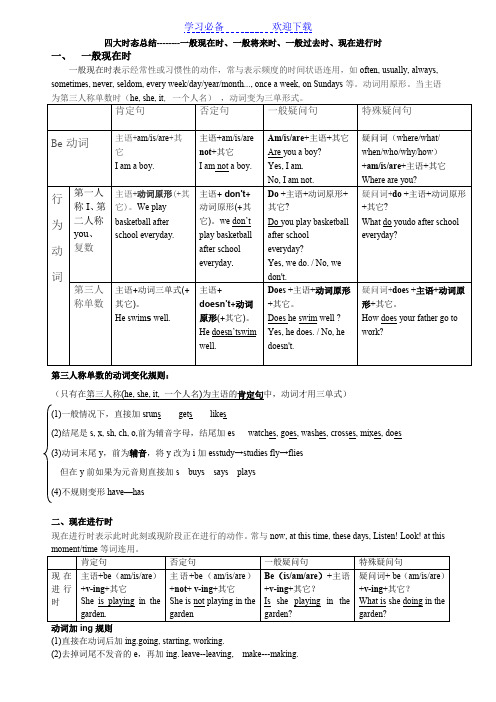
四大时态总结--------一般现在时、一般将来时、一般过去时、现在进行时一、一般现在时一般现在时表示经常性或习惯性的动作,常与表示频度的时间状语连用,如often, usually, always, sometimes, never, seldom, every week/day/year/month..., once a week, on Sundays等。
动词用原形。
当主语第三人称单数的动词变化规则:(只有在第三人称(he, she, it, 一个人名)为主语的肯定句中,动词才用三单式)(1)一般情况下,直接加sruns gets likes(2)结尾是s, x, sh, ch, o,前为辅音字母,结尾加es watches, goes, washes, crosses, mixes, does(3)动词末尾y,前为辅音,将y改为i加esstudy→studies fly→flies但在y前如果为元音则直接加s buys says plays(4)不规则变形have—has二、现在进行时现在进行时表示此时此刻或现阶段正在进行的动作。
常与now, at this time, these days, Listen! Look! at this动词加ing规则(1)直接在动词后加ing.going, starting, working.(2)去掉词尾不发音的e,再加ing. leave--leaving, make---making.注意:如果单词结尾的e发音,则不能去掉,也直接加ing. see –seeingagree - agreeing .(3) 对于动词只有一个元音,而其后跟了一个辅音字母时,双写末尾辅音字母再加ing.sitting, beginningrun – runningstop – stoppingcut – cuttingcontrol – controlling(4)以ie结尾,把ie变y再加ing。
小学英语四种时态
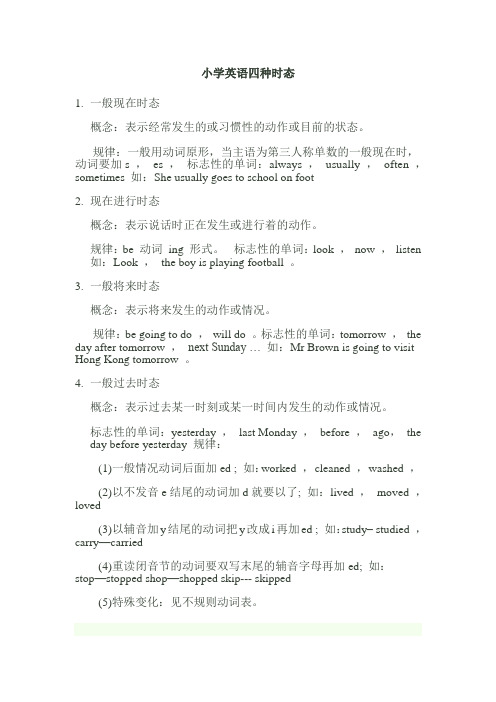
小学英语四种时态1.一般现在时态概念:表示经常发生的或习惯性的动作或目前的状态。
规律:一般用动词原形,当主语为第三人称单数的一般现在时,动词要加s ,es ,标志性的单词:always ,usually ,often ,sometimes 如:She usually goes to school on foot2.现在进行时态概念:表示说话时正在发生或进行着的动作。
规律:be 动词ing 形式。
标志性的单词:look ,now ,listen 如:Look ,the boy is playing football 。
3.一般将来时态概念:表示将来发生的动作或情况。
规律:be going to do ,will do 。
标志性的单词:tomorrow ,the day after tomorrow ,next Sunday … 如:Mr Brown is going to visit Hong Kong tomorrow 。
4.一般过去时态概念:表示过去某一时刻或某一时间内发生的动作或情况。
标志性的单词:yesterday ,last Monday ,before ,ago,the day before yesterday 规律:(1)一般情况动词后面加ed ; 如:worked ,cleaned ,washed ,(2)以不发音e结尾的动词加d就要以了; 如:lived ,moved ,loved(3)以辅音加y结尾的动词把y改成i再加ed ; 如:study– studied ,carry—carried(4)重读闭音节的动词要双写末尾的辅音字母再加ed; 如:stop—stopped shop—shopped skip--- skipped(5)特殊变化:见不规则动词表。
小学英语固定搭配Good night 晚安.in the morning 在早上at noon 在中午in the afternoon 在下午in the evening 在傍晚at night 在夜间have/eat breakfast 吃早饭have/eat lunch 吃午饭have/eat supper(dinner) 吃晚饭read a book 读书sing a song 唱歌have a meeting 开会have class 上课have a party 聚会have a competition 竞赛have a sleep 睡觉have a snack 吃零食have a picnic 野餐have a buffet dinner 吃自助餐draw pictures 画画listen to music 听音乐listen to the radio 听收音机learn English 学习英语learn Chinese 学习语文Learn math 学习数学tell stories 讲故事take a walk 散步ask and answer questions 问答问题fly a kite 放风筝ride a bike 骑自行车ride a horse 骑马play computer games 玩电脑游戏play games 做游戏play hide and seek 玩捉迷藏do homework 做作业watch TV 看电视take a shower 洗淋浴take a bath 洗澡open the door 开门open the window 开窗户close the door 关门close the window 关窗户paly football 踢足球/打橄榄球play basketball 打篮球play volleyball 打排球play badminton 打羽毛球play golf 打高尔夫球play bowling 打保龄球play table tennis 打乒乓球play baseball 打棒球play tennis 打网球play soccer 踢足球play hockey 打曲棍球play chess 下棋go fishing 去钓鱼go swimming 去游泳go shopping 去购物go skating 去滑冰go bike-riding/ go cycling 去骑自行车go sking 去滑雪go camping 去野营listen to the news 听新闻read the newspaper 看报read the magazine 看杂志go to school 去上学go home 回家go to the park 去公园go to the zoo 去动物园go to the library 去图书馆go to the hospital 去医院go to the cinema 去电影院go to see a film /movie去看电影get up 起床go to bed 上床go to sleep 去睡觉brush the teeth 刷牙wash the hands 洗手wash the face 洗脸wash clothes 洗衣服air the room 给房间通风make the bed 铺床sweep the floor 扫地mop the floor 拖地clean the room 打扫房间climb the trees 爬树climb the mountains 爬山cook the meals 做饭drink milk/juice/coca cola 喝牛奶/果汁/可乐play the piano 弹钢琴play the violin 拉小提琴play the drum 打鼓play the guitar 弹吉他play the xylophone 弹木琴play the flute 吹笛子play the harp 弹竖琴play the erhu 拉二胡play the zither 弹古筝play the banjo 弹班卓play the trumpet 吹小号stay at home 呆在家里at home 在家at school 在学校at church 在教堂make a cake 做蛋糕take pictures/photos 照相comb hair 梳头发have a haircut 理发go away 走开at the weekend 在周末stand up 起立sit down 坐下New year 元旦Spring Festival 春节Lantern Festival 元宵节Spring Cleaning Day 清明节Dragon Boat Festival 龙舟节International labour day 国际劳动节Trees planting day 植树节Children's day 儿童节Party's day 党的生日Army's day 建军节Teacher's day 教师节National day 国庆节Thanksgiving day 感恩节Chrismas day 圣诞节in the morning 在早上at noon 在中午in the afternoon 在下午in the evening 在傍晚at night 在夜间have/eat breakfast 吃早饭have/eat lunch 吃午饭have/eat supper(dinner) 吃晚饭read a book 读书sing a song 唱歌have a meeting 开会have class 上课have a party 聚会have a competition 竞赛have a sleep 睡觉have a snack 吃零食have a picnic 野餐have a buffet dinner 吃自助餐draw pictures 画画listen to music 听音乐listen to the radio 听收音机learn English 学习英语learn Chinese 学习语文Learn math 学习数学tell stories 讲故事take a walk 散步ask and answer questions 问答问题fly a kite 放风筝ride a bike 骑自行车ride a horse 骑马play computer games 玩电脑游戏play games 做游戏play hide and seek 玩捉迷藏do homework 做作业watch TV 看电视take a shower 洗淋浴take a bath 洗澡open the door 开门open the window 开窗户close the door 关门close the window 关窗户paly football 踢足球/打橄榄球play basketball 打篮球play volleyball 打排球play badminton 打羽毛球play golf 打高尔夫球play bowling 打保龄球play table tennis 打乒乓球play baseball 打棒球play tennis 打网球play soccer 踢足球play hockey 打曲棍球play chess 下棋go fishing 去钓鱼go swimming 去游泳go shopping 去购物go skating 去滑冰go bike-riding/ go cycling 去骑自行车go sking 去滑雪go camping 去野营listen to the news 听新闻read the newspaper 看报read the magazine 看杂志go to school 去上学go home 回家go to the park 去公园go to the zoo 去动物园go to the library 去图书馆go to the hospital 去医院go to the cinema 去电影院go to see a film /movie去看电影get up 起床go to bed 上床go to sleep 去睡觉brush the teeth 刷牙wash the hands 洗手wash the face 洗脸wash clothes 洗衣服air the room 给房间通风make the bed 铺床sweep the floor 扫地mop the floor 拖地clean the room 打扫房间climb the trees 爬树climb the mountains 爬山cook the meals 做饭drink milk/juice/coca cola 喝牛奶/果汁/可乐play the piano 弹钢琴play the violin 拉小提琴play the drum 打鼓play the guitar 弹吉他play the xylophone 弹木琴play the flute 吹笛子play the harp 弹竖琴play the erhu 拉二胡play the zither 弹古筝play the banjo 弹班卓play the trumpet 吹小号stay at home 呆在家里at home 在家at school 在学校at church 在教堂make a cake 做蛋糕take pictures/photos 照相comb hair 梳头发have a haircut 理发go away 走开at the weekend 在周末stand up 起立sit down 坐下New year 元旦Spring Festival 春节Lantern Festival 元宵节Spring Cleaning Day 清明节Dragon Boat Festival 龙舟节International labour day 国际劳动节Trees planting day 植树节Children's day 儿童节Party's day 党的生日Army's day 建军节Teacher's day 教师节National day 国庆节小学英语动词过去式agree 同意agreedask 问askedanswer 回答answeredbecome 成为becamebegin 开始beganbring 带来broughtbuy 买boughtcall 呼叫calledcarry 搬运carriedcatch 抓住caughtcheck 检查checkedclean 清洁cleanedclimb 爬climbedcome 来camecook 煮cookedcut 切cutdance 跳舞danceddo 做diddraw 画drewdrink 喝drankdrive 驾驶droveeat 吃ateenjoy 欣赏enjoyedfeel 感觉feltfly 飞fliedforget 忘记forgotfish 钓鱼fishedget 得到gotgive 给gavego 去wentgrow 成长grewhave 有hadhear 听到heardhelp 帮助helpedjump 跳jumpedkeep 保存keptknow 知道knewlearn 学习learned listen 听listenedlike 喜欢likedlook 看lookedlive 生活livedlove 喜爱lovedmake 做mademeet 遇见metmove 移动moved need 需要needed open 打开opened paint 画paintedpick 摘pickedplay 玩playedplan 计划planned practise 练习practised prefer 更喜欢preferred put 放putread 读readride 骑roderun 跑ransay 说saidsee 看sawsit 坐satskip 跳skippedspeak 说spokestart 开始startedstay 停留stayed sweep 扫sweptstudy 学习studied swim 游泳swamtalk 谈话talkedtake 带去tookteach 教taughtthank 谢谢thanked tell 告诉toldthink 想thought travel 旅游traveledtry 试trieduse 使用used wake 醒来woke walk 走路walked want 想wanted wash 洗washed watch 看watched water 浇水watered wave 挥动waved work 工作worked worry 担心worried write 写wrote小学英语可数名词复数形式1)以y结尾的专有名词,或元音字母+y 结尾的名词变复数时,直接加s变复数。
小学英语基础时态4种

小学英语基础时态4种一、一般现在时一般现在时基本用法介绍【No. 1】一般现在时的功能1.表示事物或人物的特征、状态。
如:The sky is blue.天空是蓝色的。
2.表示经常性或习惯性的动作。
如:I get up at six every day.我每天六点起床。
3.表示客观现实。
如:The earth goes around the sun.地球绕着太阳转。
一般现在时的构成1. be动词:主语+be(am,is,are)+其它。
如:I am a boy.我是一个男孩。
2.行为动词:主语+行为动词(+其它)。
如:We study English.我们学习英语。
当主语为第三人称单数(he, she,it)时,要在动词后加"-s"或"-es"。
如:Mary likes Chinese.玛丽喜欢汉语。
一般现在时的变化1. be动词的变化。
否定句:主语+ be + not +其它。
如:He is not a worker.他不是工人。
一般疑问句:Be +主语+其它。
如:-Are you a student?-Yes. I am. / No, I'm not.特殊疑问句:疑问词+一般疑问句。
如:Where is my bike?2.行为动词的变化。
否定句:主语+ don't( doesn't ) +动词原形(+其它)。
如:I don't like bread.当主语为第三人称单数时,要用doesn't构成否定句。
如:He doesn't often play.一般疑问句:Do( Does ) +主语+动词原形+其它。
如:- Do you often play football?- Yes, I do. / No, I don't.当主语为第三人称单数时,要用does构成一般疑问句。
如:- Does she go to work by bike?- Yes, she does. / No, she doesn't.特殊疑问句:疑问词+一般疑问句。
小学英语四种时态总结
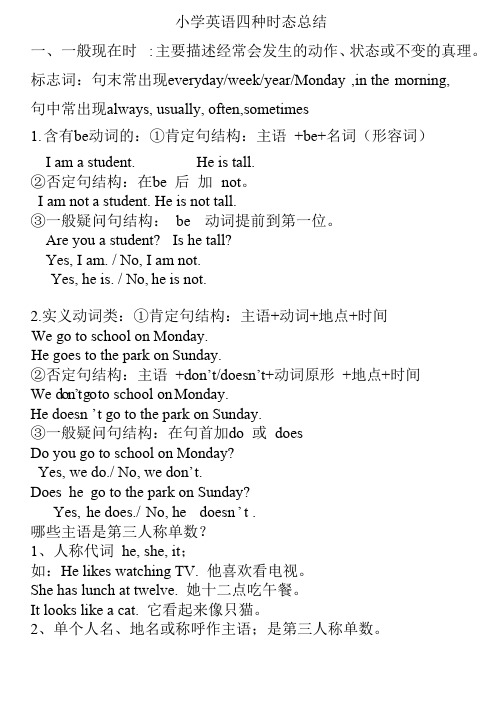
小学英语四种时态总结一、一般现在时:主要描述经常会发生的动作、状态或不变的真理。
标志词:句末常出现everyday/week/year/Monday ,in the morning,句中常出现always, usually, often,sometimes1.含有be动词的:①肯定句结构:主语+be+名词(形容词)I am a student. He is tall.②否定句结构:在be 后加not。
I am not a student. He is not tall.③一般疑问句结构:be 动词提前到第一位。
Are you a student? Is he tall?Yes, I am. / No, I am not.Yes, he is. / No, he is not.2.实义动词类:①肯定句结构:主语+动词+地点+时间We go to school on Monday.He goes to the park on Sunday.②否定句结构:主语+don’t/doesn’t+动词原形+地点+时间We don’t go to school on Monday.He doesn ’t go to the park on Sunday.③一般疑问句结构:在句首加do 或doesDo you go to school on Monday?Yes, we do./ No, we don’t.Does he go to the park on Sunday?Yes, he does./ No, he doesn ’t .哪些主语是第三人称单数?1、人称代词he, she, it;如:He likes watching TV. 他喜欢看电视。
She has lunch at twelve. 她十二点吃午餐。
It looks like a cat. 它看起来像只猫。
2、单个人名、地名或称呼作主语;是第三人称单数。
小学英语英语四大时态动词的变化

5.They_t_ak_e_ pitures in the afternoon.
动词三单式 的变化规律
1. 加 “s”; 2. 以ch,sh,o结尾加“es”; 3. 以辅音加y结尾变“ies” 4. 不规则have-has
Exercise
They_w__il_l _p_la_y__ chess this afternoon.
B be going to+动词原形
He's_g_o_in_g_t_o_w_a_tc_h_a football game on TV tonight.
They_a_r_e_g_o_i_n_g_t_o_p_l_a_y chess this afternoon.
afternoon/evening, always/often/usually/sometimes/never...
动词变化 看主语
1. I _p_la_y__football today.
2.He often_w_a_tc_h_e_sTV at home.
3.Amy_h_u_r_ri_e_sto school every morning.
Primary school
英语四大时态 动词的变化
CONTENT
一般 将来时
一般
一般 现在时
过去时
be going to
D
现在 进行时
will+do be going to+do
C
did
B be+doing
A do/does
1. 一般现在时
时间短语:
(动词原形/ 三单式)
today, every+时间,on+时间,at+几点,in the morning/
小学英语四大时态

小学英语-四大时态总结小学英语-四大时态总结1一般现在时一、标志词:always( 总是 ) usually( 通常 ) often( 经常 ) sometimes( 有时 ) never( 从不 ) every( 每一 )二、一般现在时动词变化规律:1、多数在动词后加 s play —plays like —likes2、以 s,x,sh,ch ,o 结尾的动词加 es wash –washes catch –catches do –does3、以辅音字母加 y 结尾,把 y 改 i 再加 es fly—flies study —studies4、以元音字母加 y 结尾,直接加 s buy – buys5、不规则变化 have —has三、一般现在时基本用法功能1.表示事物或人物的特征、状态。
如:The sky is blue. 天空是蓝色的。
2.表示经常性或习惯性的动作。
如:I get up at six every day. 我每天六点起床。
3.表示客观现实。
如:The earth goes around the sun. 地球绕着太阳转。
The earth is round.四、构成1. be 动词:主语 +be(am,is,are)+ 其它。
如:I am a boy. 我是一个男孩。
2.行为动词:主语 +行为动词 (+其它 )。
如:We study English. 我们学习英语。
五、句型肯定句:A.be 动词:主语 + be + 其它成分He is a worker.B. 行为动词:主语 +动词 (注意人称变化 ) + 其它成分We like the little cat.否定句:A.be 动词:主语 + be + not + 其它成分They are not students.B. 行为动词:主语 +助动词 (do/does) + not + 动词原形 +其它成分We don’t like the little cat.一般疑问句:A.be 动词:Am / Is /Are + 主语 + 其它成分Are you a teacher? Yes, I am. / No, I am not.Are they students of your school.Yes they are / No they aren,t.B. 行为动词:助动词 (Do/Does) +主语 +动词原形 + 其它成分Do you like it? Yes, I do. / No. I don’t .Does he(she) like it? Yes, he( she )does. / No, he( she )doesn’t.特殊疑问句:疑问词 + 一般疑问句A.be 动词:How many students are there in your school?B. 行为动词:What do you usually do on Sunday?一般现在时动词 be 和 have 的变化形式1.动词 Be 叫连系动词 , 用法:第一人称单数用 am ,第三人称单数用 is,其它人称用 are。
小学英语语法-四大时态
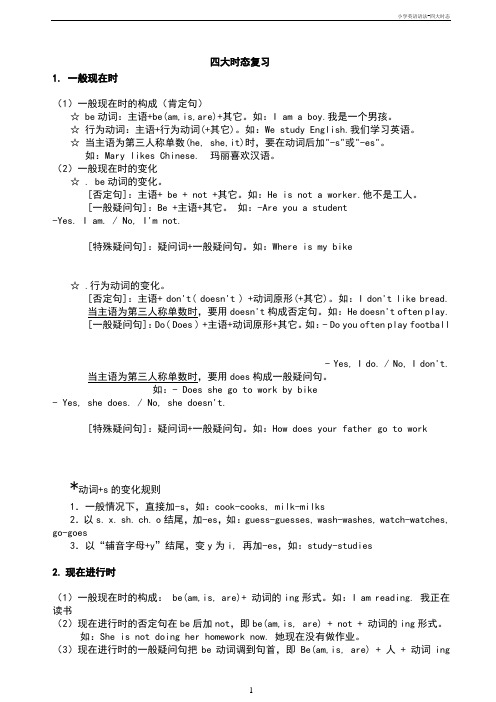
四大时态复习1. 一般现在时(1)一般现在时的构成(肯定句)☆ be动词:主语+be(am,is,are)+其它。
如:I am a boy.我是一个男孩。
☆行为动词:主语+行为动词(+其它)。
如:We study English.我们学习英语。
☆当主语为第三人称单数(he, she,it)时,要在动词后加"-s"或"-es"。
如:Mary likes Chinese. 玛丽喜欢汉语。
(2)一般现在时的变化☆ . be动词的变化。
[否定句]:主语+ be + not +其它。
如:He is not a worker.他不是工人。
[一般疑问句]:Be +主语+其它。
如:-Are you a student-Yes. I am. / No, I'm not.[特殊疑问句]:疑问词+一般疑问句。
如:Where is my bike☆ .行为动词的变化。
[否定句]:主语+ don't( doesn't ) +动词原形(+其它)。
如:I don't like bread.当主语为第三人称单数时,要用doesn't构成否定句。
如:He doesn't often play.[一般疑问句]:Do( Does ) +主语+动词原形+其它。
如:- Do you often play football- Yes, I do. / No, I don't.当主语为第三人称单数时,要用does构成一般疑问句。
如:- Does she go to work by bike- Yes, she does. / No, she doesn't.[特殊疑问句]:疑问词+一般疑问句。
如:How does your father go to work*动词+s的变化规则1.一般情况下,直接加-s,如:cook-cooks, milk-milks2.以s. x. sh. ch. o结尾,加-es,如:guess-guesses, wash-washes, watch-watches, go-goes3.以“辅音字母+y”结尾,变y为i, 再加-es,如:study-studies2.现在进行时(1)一般现在时的构成: be(am,is, are)+ 动词的ing形式。
四种小学英语时态(含举例)
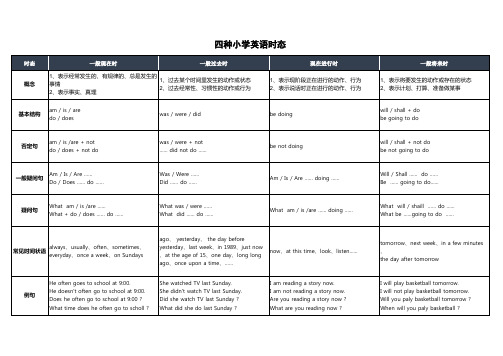
疑问句
What am / is /are …… What + do / does …… do ……
What was / were …… What did …… do ……
What am / is /are …… doing ……
What will / shaill …… do …… What be ……going to do ……
常见时间状语 always、usually、often、sometimes、 everyday、once a week、on Sundays
ago、 yesterday、 the day before yesterday、last week、in 1989、just now 、at the age of 15、one day、long long ago、once upon a time、……
tomorrow、next week、in a few minutes 、 the day after tomorrow
I will play basketball tomorrow. I will not play basketball tomorrow. Will you paly basketball tomorrow ? When will you paly basketball ?
She watched TV last Sunday. She didn't watch TV last Sunday. Did she watch TV last Sunday ? What did she do last Sunday ?
I am reading a story now. I am not reading a story now. Are you reading a story now ? What are you reading now ?
- 1、下载文档前请自行甄别文档内容的完整性,平台不提供额外的编辑、内容补充、找答案等附加服务。
- 2、"仅部分预览"的文档,不可在线预览部分如存在完整性等问题,可反馈申请退款(可完整预览的文档不适用该条件!)。
- 3、如文档侵犯您的权益,请联系客服反馈,我们会尽快为您处理(人工客服工作时间:9:00-18:30)。
英语四种时态解析1.不规则动词过去式Sweep--swept teach –taught have-- had go --wentkeep-- kept think-- thought do--did find-- foundsleep--slept buy-- bought eat-- ate say --saidfeel --felt drink-- drank is/am—was take-- tookread-- read give-- gave are --were mean --meantput –put sing sang drive—drove meet --metcut --cut begin-- began speak-- spoke make-- madelet --let ring-- rang write --wrote see --sawfly --flew run --ran ride –rode come-- camedraw --drew sit-- sat hear --heard tell --toldgrow –grew get --got know –knew learn --learned/learnt时态综合练习一、用所给动词的适当形式填空1.Tom and Mary ___________ (come) to China last month.2.Mike _________________(not go) to bed until 12 o’clock last night. So I _______ (get ) up l ate.3.Mary __________ (read) English yesterday morning.4.There _________ (be) no one here a moment ago.5.I ___________ (call) Mike this morning.6.I listened but ___________ (hear) nothing.7.Tom ___________ (begin) to learn Chinese last year.st week we _________ (pick) many apples on the farm.9.My mother ________________ (not do) housework yesterday.10.She watches TV every evening. But she _______________ (not watch) TV last night.11.________ your father ________ ( go ) to work every day last year?12. —What time _______ you _______ (get) to Beijing yesterday? —We __________ (get) to Beijing at 9:00 in the evening.13.What __________ (make) him cry just now?st year the teacher ___________ (tell) us that the earth moves around the sun.15.There ____________ a telephone call for you just now. (be)16.There __________ not enough people to pick apples that day. ( be)17.There _____________ any hospitals in my hometown in 1940. ( be not)18.There ____________ enough milk at home las t week, wasn’t there?19. Eli ____________ to Japan last week. ( move)20.–When _______ you _________ (come) to China? - Last year.21.Did she ________ (have) supper at home?22.Jack ____________ (not clean) the room just now.23._________ (be) it cold in your city yesterday?24.How many people ________ (be) there in your class last term?25.It ________ (be) hot yesterday and most children _______ (be) outside26. There ________ (be) a football match on TV yesterday evening, but I _________ (have) no time to watch it.27. He ate some bread and _________ (drink) some milk.28. ________ he __________ (finish) his homework last night?29. I__________(be) tired yesterday.30. I ___________(gain ) Arts degree last year.31. What _________ you ___________ (do) last night?32. My grandfather _________ (leave) Hong Kong for New York in 1998.33. What _______ he ________ (do) yesterday?34. Last week I _______ (buy) a new bike.35. He ________ (be) here just now.36. He __________ (not find ) his key last night.37. My father __________ (drink) a lot of wine yesterday.38. ________ you ________ (finish) your homework yesterday?39. I ________ (eat) some eggs and bread this morning.40. Her mother __________ (not give) the girl any present.41.The buses ______ (use) a lot of oil.42.My daughter _________ (watch) TV every day. Sometimes she _______ (see) a film on Sunday.43.Li Wei ________ (have) a daughter.44.Her mother ___________ (teach) English at a middle school.45.Jack often ___________ (listen) to the radio.46.He ________ (say) that Li Lei is tired.47.Tom and Mary ___________ (come) to China last month.48.Mike _________________(not go) to bed until 12 o’clock last night. So I _______ (get ) up late.49.Mary __________ (read) English yesterday morning.50.There _________ (be) no one here a moment ago.51.I ___________ (call) Mike this morning.52.I listened but ___________ (hear) nothing.53.Tom ___________ (begin) to learn Chinese last year.st week we _________ (pick) many apples on the farm.55.My mother ________________ (not do) housework yesterday.56.She watches TV every evening. But she _______________ (not watch) TV last night.57.________ your father ________ ( go ) to work every day last year?58.—What time _______ you _______ (get) to Beijing yesterday? —We __________ (get) to Beijing at 9:00 in the evening.59.What __________ (make) him cry just now?st year the teacher ___________ (tell) us that the earth moves around the sun.。
